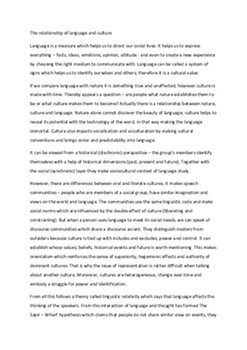The relationship of language and culture
Language is a measure which helps us to direct our social lives. It helps us to express everything – facts, ideas, emotions, opinion, attitude - and even to create a new experience by choosing the right medium to communicate with. Language can be called a system of signs which helps us to identify ourselves and others; therefore it is a cultural value.
If we compare language with nature it is something true and unaffected, however culture is made with time. Thereby appears a question – are people what nature establishes them to be or what culture makes them to become? Actually there is a relationship between nature, culture and language. Nature alone cannot discover the beauty of language; culture helps to reveal its potential with the technology of the word, in that way making the language immortal. Culture also impacts socialization and acculturation by making cultural conventions and brings order and predictability into language.
It can be viewed from a historical (diachronic) perspective – the group’s members identify themselves with a help of historical dimensions (past, present and future). Together with the social (synchronic) layer they make sociocultural context of language study.
However, there are differences between oral and literate cultures. It makes speech communities – people who are members of a social group, have similar imagination and views on the world and language. The communities use the same linguistic code and make social norms which are influenced by the double effect of culture (liberating and constraining). But when a person uses language to meet its social needs, we can speak of discourse communities which share a discourse accent. They distinguish insiders from outsiders because culture is tied up with includes and excludes, power and control. It can establish whose values, beliefs, historical events and future is worth mentioning. This makes orientalism which reinforces the sense of superiority, hegemonic effects and authority of dominant cultures. That is why the issue of representation is rather difficult when talking about another culture. Moreover, cultures are heterogeneous, change over time and embody a struggle for power and identification.
From all this follows a theory called linguistic relativity which says that language affects the thinking of the speakers. From this interaction of language and thought has formed The Sapir – Whorf hypothesis which claims that people do not share similar view on events, they do not comprehend reality and experience in the same manner and there are cultural differences in their associations which are caused by common perceptions. Basically we are prisoners of our own language. That is why language users sort out and tell apart different experiences according to the semantic categories ensured by their respective codes.











